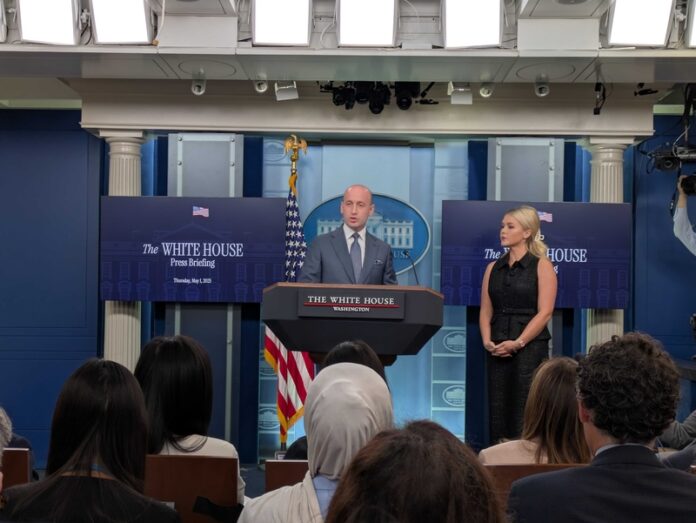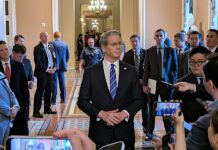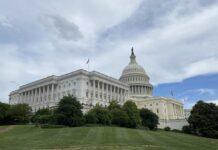
WASHINGTON (States Newsroom) — Despite news that the U.S. economy has contracted since January, White House Deputy Chief of Staff Stephen Miller said Thursday that President Donald Trump’s policies are working to “unleash this era of American prosperity.”
Miller, also a top adviser for Trump on immigration, dismissed fears from the small business community and American consumers when pressed by reporters during the final in a series of press briefings marking Trump’s first 100 days.
Questions centered on Trump’s steep 145% tariffs on any goods, including manufacturing parts, imported from China, as well as baseline 10% tariffs on products brought into the U.S. from nearly every other country.
Tariffs are an import tax paid to the U.S. government by American companies and individuals who purchase goods from abroad. A broad consensus among economists is that those costs are passed to consumers.
When asked what the administration’s end goal is for its trade war with China — the nation now charges 125% tariffs on American products entering its borders — Miller said “we need to have a trade relationship with China that does not do harm to our nation’s economic and national security.”
“At the same time, tariffs will bring significant revenue into this country that will allow us to pursue our dramatic plan of tax cuts and reforms,” he said, referring to the massive budget reconciliation package underway in the Republican-led House and Senate.
Tariff order, then a pause
Trump initially triggered much higher rates on products from major trading partners — for example, 20% on European Union goods and up to 46% on products from Vietnam — but paused them for 90 days at a baseline 10% after investor panic erased trillions from the U.S. stock market. The administration maintains it will have new trade agreements in place by the July deadline.
The Institute for Supply Management’s April manufacturing report cited tariff concerns and an “unknown economic environment” for the manufacturing sector’s second month of contraction.
Department of Commerce figures released Wednesday showed the U.S. gross domestic product — a country’s total value of goods and services — decreased at an annual rate of 0.3% since January, the first time GDP dipped into the negative since the first quarter of 2022.
Meanwhile, U.S. consumer sentiment saw its steepest percentage decline over a three-month period since the 1990 recession, according to the University of Michigan’s April survey of consumers.
Tax plans
In response to an inquiry about a U.S. Chamber of Commerce plea for small business tariff relief, Miller said Thursday, “The relief for small businesses is going to come in the form of the largest tax cut in American history.”
At the heart of congressional Republicans’ massive budget reconciliation package is the extension of Trump’s 2017 tax law. Wholesale extending the 2017 Tax Cuts and Jobs Act is expected to reduce federal revenue by roughly $4.5 trillion over a decade. And, depending on how or if lawmakers pay for the tax cuts, the costs could shrink the economy in the long run, according to the Committee for a Responsible Federal Budget’s analysis of Congressional Budget Office figures.
Miller said Trump’s promise to businesses to revive and expand 100% expensing for business investments in the U.S. will make it “the most pro-small business tax bill in American history.”
House and Senate Republican leaders have indicated differing timelines for final passage of the tax deal — varying from Memorial Day to July 4.
Business community worries
An April 30 letter from the Chamber of Commerce to the administration warned of “irreparable harm” to small businesses, even if the administration strikes new tariff agreements over the next weeks or months.
“The Chamber is hearing from small business owners every day who are seeing their ability to survive endangered by the recent increase in tariff rates,” the letter stated.
Three Republican senators broke with the GOP Wednesday night and voted to rebuke Trump on tariffs. The largely symbolic measure ultimately failed after Republican opposition.
Treasury Secretary Scott Bessent told reporters Tuesday the administration is in conversations with 17 trading partners but would not give any details on talks with China.
Economists are now awaiting Friday’s “all-important” jobs report for any further snapshot of U.S. economic health, as Mark Zandi of Moody’s Analytics wrote Sunday on X.
“If payroll jobs increase by 150k, give or take, which is the consensus, all the weak economic data released during the week will be forgotten, at least for a bit. Fingers crossed. If employment increases by less than 100k, watch out,” he wrote.






